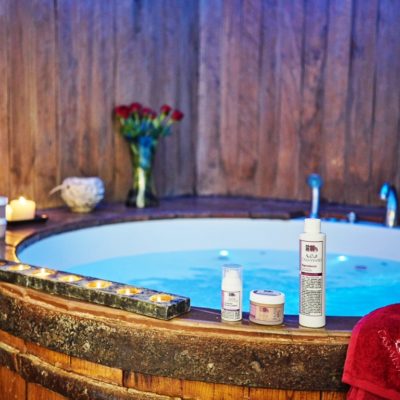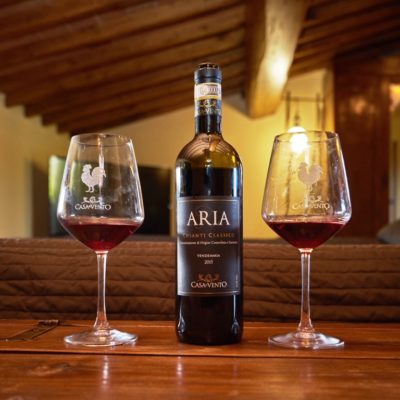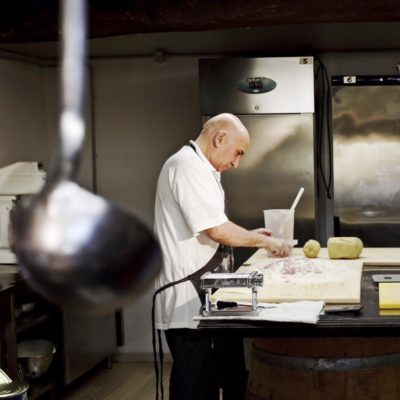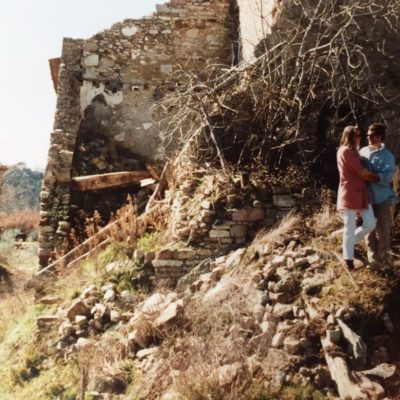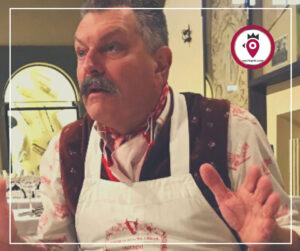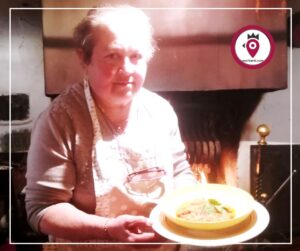Articolo disponibile anche in: Italian
A long time ago Francesco Gioffreda, who used to work as a manager in a big international company, decided to come back to his roots. And his roots were quite deep, planted on one of the most beautiful hills of the Chianti Classico territory in the province of Siena. In Barbischio, a village in the municipality of Gaiole in Chianti.
What is Borgo Casa al Vento for you?
“It’s the continuation of a dream that my parents had nurtured. After my mother’s premature death my father was left alone, and at that point I decided to follow his very same dream. It has been, and still is, a real challenge and a constant commitment. When my dad bought the Borgo in the early nineties, many thought it was an impossible challenge. The houses were dilapidated, and the surrounding land was in a state of total abandonment. It was quite hard to believe it would be possible to bring the past splendour of the place back. The restoration work on the houses, done by re-assembling the stones in order to recover the original appearance, was our first challenge. But we overcame it. And then we got one of the first tourist licenses in Gaiole in Chianti, therefore we were among the first ones to bring tourists to the Chianti region, first from abroad, then from the rest of Italy. Obviously, the next step was to start investing in the vineyards and the wine production technology to make a wine, which could be at once competitive and authentic. To me Borgo Casa al Vento represents all of this, what I like to define … the essence of the Chianti”.
What is your opinion about the hospitality sector in the Chianti Classico region? After all it’s a sector which is an important part of the local economy.
“I’d like to start from the territory, and talk about Gaiole in Chianti, an efficient municipality that, thanks to the Eroica, has gained extraordinary visibility and notoriety. This is definitely a good starting point, because attracting tourists is vital. But it’s not the only thing to consider: I think that in order to consolidate the hospitality sector, it would be necessary for local companies to collaborate and form associations. This could be a very constructive strategy, that could help to contain the monopoly of global travel websites that tend to standardize the tourism offering, even in areas like the Chianti, where this should not be happening. Associations should also help to offer useful services to the visitors, and help the public administrations to take functional decisions in regards to tourism development. This is the most important lesson that local businesses must learn: to overcome feelings of envy and fear towards their neighbours, and recognise the great opportunities that come with being united in strong associations”.
What strengths should we base our future on?
“The territory is our strong point, but we cannot think that this is enough to attract tourists. It’s certainly not enough to make them come back. Tourists are increasingly more demanding and competent, and it’s getting easier to make comparisons. Companies that work in the hospitality sector need to be offering good services, and invest to improve their quality, as this is the only way to be competitive. Trade associations and consortia should become more active in helping small businesses to benefit from the financial support that comes from the EU. These financial aids too often are lost because of lack of information, as we small businesses often find it hard to access these opportunities. Furthermore I strongly believe that we should extend the tourist season in the Chianti territory. Usually everything shuts down from November 3rd, while we should take advantage of all the special things that autumn has to offer: the inebriating flavour of new the olive oil, extraordinary autumn colours, the scent and warmth of a relaxing holiday spent in the company of a fireplace”.
Your experience is quite unique, from global manager to local “farmer”: how is your previous knowledge helping you today?
“My professional experience has certainly helped me a lot, I benefit from it every day. As an example, I was working as part of an international team in Russia, during the Perestroika in the early 1990’s, and that experience taught me to be resilient. I also had the opportunity to get to know different cultures, and witness the failure of a centralized economy. Now I find myself living a totally different reality; certainly the jump had been impressive and I don’t hide all the difficulties that we face every day. And while before I was used to doing the planning and budgeting, farming has taught me that the math can only be done once the harvest is over. I learned how to deal with all the daily emergencies. Above all I have learned that the land and its products must be respected, defended and nourished, never exploited”.
Why, in your opinion, should a tourist pick Chianti as his favourite destination today? How are you meeting the guests’ needs in your agriturismo?
“Chianti is synonymous with countryside and wine, and has a strong gastronomic and peasant tradition. A holiday in the Chianti region can only be born from love of uncontaminated nature, as people come here to enjoy tranquillity and the sounds of the countryside. But this, as I said, is not enough: we should help our guests to make the most of our territory by helping them to discover the most authentic experiences. Today 90% of visitors, when they arrive at a hotel, whether for work or vacation, ask if there is Wi-Fi, and then they ask for the password. This is unfortunately one of the primary needs of today’s tourists, even at Borgo Casa al Vento. My purpose, or rather my dream, is to re-educate my guest by offering a “detox” vacation, starting right by renouncing to WI-FI connection for a day, and accept that if the room doesn’t have a TV it’s a good thing, not a bad one.”
Matteo Pucci
